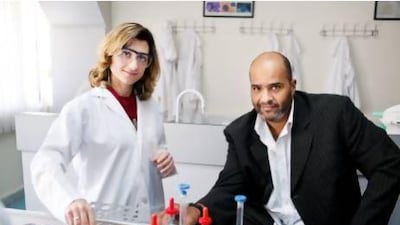ABU DHABI // A Zayed University study has shown that the expression "a little ray of sunshine" is perfectly apt.
The study backs the popular belief that sunshine makes people happy.
The pilot study involved 20 female students at the university, 90 per cent of whom were Emirati, and will be the precursor to a bigger investigation that aims to provide the UAE with a guide as to how long people should stay in the sun.
"We proved that sun exposure is an effective way to improve the Vitamin D level and improve mood," said Dr Fatme Al Anouti, assistant professor in the university's natural science and public health department.
The study began when more than 100 students filled out two online questionnaires.
The first measured their sun exposure levels and the second their mood, providing a Beck Depression Inventory (BDI) score.
Twenty students who were proven to be deficient in Vitamin D by a blood test and showing depressive symptoms were selected.
The group was split into two. One group was encouraged to spend more time in the sun for seven weeks from the end of January.
"We explained about the benefits of being exposed to the sun for some time," explained Dr Al Anouti, who conducted the study with associate professor Dr Justin Thomas.
"Even though we have a hectic lifestyle now we don't have time to go out, but we thought you can manage to squeeze 10 minutes at least each day."
People in the second group were told their Vitamin D levels were low and were encouraged to see a doctor, but were allowed to continue their lives as normal.
At the end of the seven weeks all participants had their Vitamin D levels retested and filled out mood questionnaires to provide another BDI score.
Average Vitamin D levels in the group encouraged to spend more time in the sun had increased, said Dr Al Anouti.
Some had sufficient levels while others who were severely deficient before had improved. Their average BDI scores also showed improvements in mood.
"That particular group showed less symptoms of depression," said Dr Al Anouti.
Average Vitamin D levels in the second group were found to have decreased and their BDI scores remained "almost the same", said the assistant professor, who hopes the study will be published in a public health journal.
"This is a pilot study which had a very small size but it will guide future studies that will focus on a larger sample size," she said.
The next study will have a greater focus on encouraging participants to change their behaviour and spend more time in the sun.
The aim will be to produce a guide on the time people should spend in the sun each day, taking into account factors such as the risk of skin cancer.
A previous study by a team from Zayed University and the Institute of Laboratory Medicine at Sheikh Khalifa Medical City in the capital, published in 2011, was one of the first in the region to link the change in seasons in the Gulf to depressive symptoms and Vitamin D deficiency.
It closely monitored any shift in mood among 197 female undergraduate students over two-week periods in October and March.
Participants completed individual questionnaires and submitted blood samples to test their Vitamin D levels.
The research found that depressive symptoms and decreasing levels of the vitamin were far more prevalent in samples taken in October, at the end of summer.
"In the previous study we documented that there is a link between Vitamin D and depression," said Dr Al Anouti.
"But in this study we showed that if you improve your Vitamin D level, you will improve your mood."
The UAE has one of the highest rates of Vitamin D deficiency in the world.
Experts have estimated that 60 per cent of men and 65 per cent of women in the Emirates are deficient in the vitamin.
About 90 per cent of a person's recommended intake of Vitamin D is produced by the body in response to the sun's ultraviolet rays.
The rest is derived from foods such as fish and milk.
@ For more on NUTRITION, visit thenational.ae/topics

